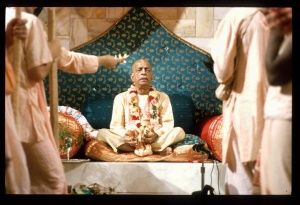CC Madhya 8.163: Difference between revisions
m (1 revision(s)) |
No edit summary |
||
| Line 1: | Line 1: | ||
{{ | [[Category:Sri Caitanya-caritamrta - Madhya-lila Chapter 08|C163]] | ||
<div style="float:left">'''[[Sri Caitanya-caritamrta|Śrī Caitanya-caritāmṛta]] - [[CC Madhya|Madhya-līlā]] - [[CC Madhya 8|Chapter 8: Talks Between Śrī Caitanya Mahāprabhu and Rāmānanda Rāya]]'''</div> | |||
<div style="float:right">[[File:Go-previous.png|link=CC Madhya 8.162|Madhya-līlā 8.162]] '''[[CC Madhya 8.162|Madhya-līlā 8.162]] - [[CC Madhya 8.164|Madhya-līlā 8.164]]''' [[File:Go-next.png|link=CC Madhya 8.164|Madhya-līlā 8.164]]</div> | |||
{{CompareVersions|CC|Madhya 8.163|CC 1975|CC 1996}} | |||
{{RandomImage}} | |||
==== TEXT 163 ==== | ==== TEXT 163 ==== | ||
<div | <div class="verse"> | ||
ānanda-cinmaya-rasa-pratibhāvitābhis | :ānanda-cinmaya-rasa-pratibhāvitābhis | ||
tābhir ya eva nija-rūpatayā kalābhiḥ | :tābhir ya eva nija-rūpatayā kalābhiḥ | ||
goloka eva nivasaty akhilātma-bhūto | :goloka eva nivasaty akhilātma-bhūto | ||
govindam ādi-puruṣaṁ tam ahaṁ bhajāmi | :govindam ādi-puruṣaṁ tam ahaṁ bhajāmi | ||
</div> | </div> | ||
| Line 14: | Line 18: | ||
==== SYNONYMS ==== | ==== SYNONYMS ==== | ||
<div | <div class="synonyms"> | ||
''ānanda''—bliss; ''cit''—knowledge; ''maya''—consisting of; ''rasa''—mellows; ''prati''—every second; ''bhāvitābhiḥ''—who are engrossed with; ''tābhiḥ''—with those; ''yaḥ''—who; ''eva''—certainly; ''nija-rūpatayā''—with His own form; ''kalābhiḥ''—who are parts of portions of His pleasure potency; ''goloke''—in Goloka Vṛndāvana; ''eva''—certainly; ''nivasati''—resides; ''akhila-ātma''—as the soul of all; ''bhūtaḥ''—who exists; ''govindam''—Lord Govinda; ''ādi-puruṣam''—the original personality; ''tam''—Him; ''aham''—I; ''bhajāmi''—worship. | |||
</div> | </div> | ||
| Line 21: | Line 25: | ||
==== TRANSLATION ==== | ==== TRANSLATION ==== | ||
<div | <div class="translation"> | ||
“‘I worship Govinda, the primeval Lord, who resides in His own realm, Goloka, with Rādhā, who resembles His own spiritual figure and who embodies the ecstatic potency [hlādinī]. Their companions are Her confidantes, who embody extensions of Her bodily form and who are imbued and permeated with ever-blissful spiritual rasa.’ | “‘I worship Govinda, the primeval Lord, who resides in His own realm, Goloka, with Rādhā, who resembles His own spiritual figure and who embodies the ecstatic potency [hlādinī]. Their companions are Her confidantes, who embody extensions of Her bodily form and who are imbued and permeated with ever-blissful spiritual rasa.’ | ||
</div> | </div> | ||
| Line 28: | Line 32: | ||
==== PURPORT ==== | ==== PURPORT ==== | ||
<div | <div class="purport"> | ||
This is a quotation from the Brahma-saṁhitā ( | This is a quotation from the ''Brahma-saṁhitā'' (BS 5.38). | ||
</div> | </div> | ||
__NOTOC__ | |||
<div style="float:right; clear:both;">[[File:Go-previous.png|link=CC Madhya 8.162|Madhya-līlā 8.162]] '''[[CC Madhya 8.162|Madhya-līlā 8.162]] - [[CC Madhya 8.164|Madhya-līlā 8.164]]''' [[File:Go-next.png|link=CC Madhya 8.164|Madhya-līlā 8.164]]</div> | |||
__NOTOC__ | |||
__NOEDITSECTION__ | |||
Revision as of 10:47, 18 August 2021

A.C. Bhaktivedanta Swami Prabhupada
TEXT 163
- ānanda-cinmaya-rasa-pratibhāvitābhis
- tābhir ya eva nija-rūpatayā kalābhiḥ
- goloka eva nivasaty akhilātma-bhūto
- govindam ādi-puruṣaṁ tam ahaṁ bhajāmi
SYNONYMS
ānanda—bliss; cit—knowledge; maya—consisting of; rasa—mellows; prati—every second; bhāvitābhiḥ—who are engrossed with; tābhiḥ—with those; yaḥ—who; eva—certainly; nija-rūpatayā—with His own form; kalābhiḥ—who are parts of portions of His pleasure potency; goloke—in Goloka Vṛndāvana; eva—certainly; nivasati—resides; akhila-ātma—as the soul of all; bhūtaḥ—who exists; govindam—Lord Govinda; ādi-puruṣam—the original personality; tam—Him; aham—I; bhajāmi—worship.
TRANSLATION
“‘I worship Govinda, the primeval Lord, who resides in His own realm, Goloka, with Rādhā, who resembles His own spiritual figure and who embodies the ecstatic potency [hlādinī]. Their companions are Her confidantes, who embody extensions of Her bodily form and who are imbued and permeated with ever-blissful spiritual rasa.’
PURPORT
This is a quotation from the Brahma-saṁhitā (BS 5.38).